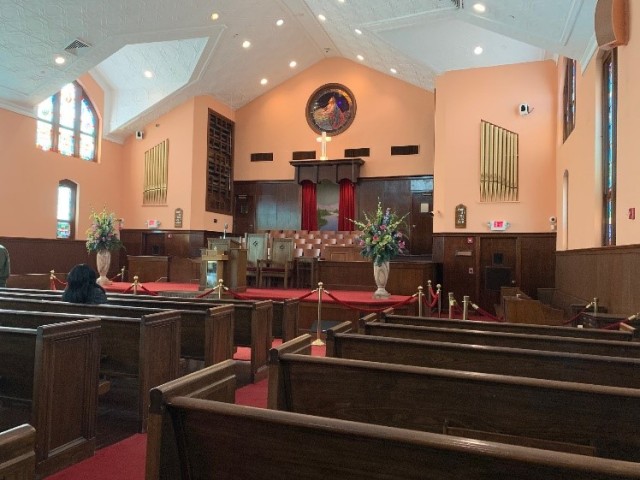“People who think nonviolence is easy don’t realize that it’s a spiritual discipline that requires a great deal of strength, growth, and purging of the self
so that one can overcome almost any obstacle for the good of all
without being concerned about one’s own welfare.”
Coretta Scott King
On the property adjacent to Ebenezer Baptist Church stands The Martin Luther King, Jr. Center for Nonviolent Social Change (“The King Center”). Conceived by Coretta Scott King to be a living memorial, the Center bears a mission to “prepare global citizens to create a more just, humane and peaceful world using Dr. King’s nonviolent philosophy and methodology” (https://thekingcenter.org/).
Dr. and Mrs. King lie entombed at the King Center, in the center of a reflecting pool with Martin’s prophetic words cascading down:
“We will not be satisfied
until justice rolls down like water
and righteousness
like a mighty stream.”
(based upon Amos 5:24)
On display are items as personal as Martin’s small leather suitcase – the one he took with him on all his travels, including his final journey to Memphis; a wooden valet box, with his collection of tie tacks, cuff links, tie clips, and several keys; his Nobel Peace Prize, and the evening gown Coretta wore when he received it. Also on display are the Six Principles of Nonviolence – the philosophy and theology of love in action to which both Martin and Coretta dedicated their lives.

The King Center is more than a museum; more than a display of historical artifacts and timelines. It is a place that means to change lives – to educate, challenge, and activate young and old alike. The ultimate goal of the King Center is the creation of the Beloved Community; to train a critical mass of people to embrace an unshakable commitment to nonviolence. In support of their mission, I include here Dr. King’s six principles and six steps of nonviolence through which Dr. King believed the Beloved Community could be achieved (source: https://thekingcenter.org/king-philosophy/).
SIX PRINCIPLES OF NONVIOLENCE
Fundamental tenets of Dr. King’s philosophy of nonviolence
described in his first book, Stride Toward Freedom.
PRINCIPLE ONE:
Nonviolence is a way of life for courageous people.
It is active nonviolent resistance to evil.
It is aggressive spiritually, mentally and emotionally.
PRINCIPLE TWO:
Nonviolence seeks to win friendship and understanding.
The end result of nonviolence is redemption and reconciliation.
The purpose of nonviolence is the creation of the Beloved Community.
PRINCIPLE THREE:
Nonviolence seeks to defeat injustice not people.
Nonviolence recognizes that evildoers are also victims and are not evil people.
The nonviolent resister seeks to defeat evil not people.
PRINCIPLE FOUR:
Nonviolence holds that suffering can educate and transform.
Nonviolence accepts suffering without retaliation.
Unearned suffering is redemptive and has tremendous
educational and transforming possibilities.
PRINCIPLE FIVE:
Nonviolence chooses love instead of hate.
Nonviolence resists violence of the spirit as well as the body.
Nonviolent love is spontaneous, unmotivated, unselfish and creative.
PRINCIPLE SIX:
Nonviolence believes that the universe is on the side of justice.
The nonviolent resister has deep faith that justice will eventually win.
Nonviolence believes that God is a God of justice.
SIX STEPS OF NONVIOLENT SOCIAL CHANGE
The Six Steps for Nonviolent Social Change are based on
Dr. King’s nonviolent campaigns and teachings that emphasize love in action.
Dr. King’s philosophy of nonviolence,
as reviewed in the Six Principles of Nonviolence,
guide these steps for social and interpersonal change.
- INFORMATION GATHERING: To understand and articulate an issue, problem or injustice facing a person, community, or institution you must do research. You must investigate and gather all vital information from all sides of the argument or issue so as to increase your understanding of the problem. You must become an expert on your opponent’s position.
- EDUCATION: It is essential to inform others, including your opposition, about your issue. This minimizes misunderstandings and gains you support and sympathy.
- PERSONAL COMMITMENT: Daily check and affirm your faith in the philosophy and methods of nonviolence. Eliminate hidden motives and prepare yourself to accept suffering, if necessary, in your work for justice.
- DISCUSSION/NEGOTIATION: Using grace, humor and intelligence, confront the other party with a list of injustices and a plan for addressing and resolving these injustices. Look for what is positive in every action and statement the opposition makes. Do not seek to humiliate the opponent but to call forth the good in the opponent.
- DIRECT ACTION: These are actions taken when the opponent is unwilling to enter into, or remain in, discussion/negotiation. These actions impose a “creative tension” into the conflict, supplying moral pressure on your opponent to work with you in resolving the injustice.
- RECONCILIATION: Nonviolence seeks friendship and understanding with the opponent. Nonviolence does not seek to defeat the opponent. Nonviolence is directed against evil systems, forces, oppressive policies, unjust acts, but not against persons. Through reasoned compromise, both sides resolve the injustice with a plan of action. Each act of reconciliation is one step closer to the ‘Beloved Community.’



